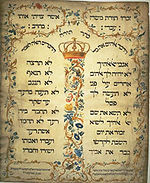Portal:Christianity/Selected article/June 2008
The Ten Commandments, or Decalogue, are a list of religious and moral imperatives which, according to Biblical tradition, were written by God and given to Moses on Mount Sinai in the form of two stone tablets. They feature prominently in Judaism and Christianity. The phrase "Ten Commandments" generally refers to the very similar passages in Exodus 20:2–17 and Deuteronomy 5:6–21. Some distinguish between this "Ethical Decalogue" and a series of ten commandments in Exodus 34 that are labelled the "Ritual Decalogue".
The commandments passage in Exodus contains more than ten imperative statements, totalling 14 or 15 in all. However, the Bible itself assigns the count of "10", using the Hebrew phrase ʻaseret had'varim—translated as the 10 words, statements or things. Various religions divide the commandments differently.
In Biblical Hebrew language, the commandments are termed עשרת הדברים (translit. Aseret ha-Dvarîm) and in Rabbinical Hebrew עשרת הדברות (translit. Aseret ha-Dibrot), both translatable as "the ten statements." The name "Decalogue" is derived from the Greek name δεκάλογος or "dekalogos" ("ten statements") found in the Septuagint (Exodus 34:28, Deuteronomy 10:4), which is the Greek translation of the Hebrew name.
According to Biblical text, the commandments represent the utterances of God on Mount Sinai. There are biblical passages that also refer to ten commandments being written by God on stone, which he gave to Moses. Moses then gave them to the people of Israel in the third month after their Exodus from Egypt. After receiving the commandments and returning to Mount Sinai, Moses saw that the Israelites had "defiled themselves", and that his brother, Aaron, had made a Golden Calf and an altar in front of it. Moses, in terrible anger, broke the tablets. God later had Moses carve two other tablets, to replace the ones he smashed. God himself appears as the writer. This second set, brought down from Mount Sinai by Moses, was placed in the Ark of the Covenant, hence designated as the "Ark of the Testimony."
(More)

